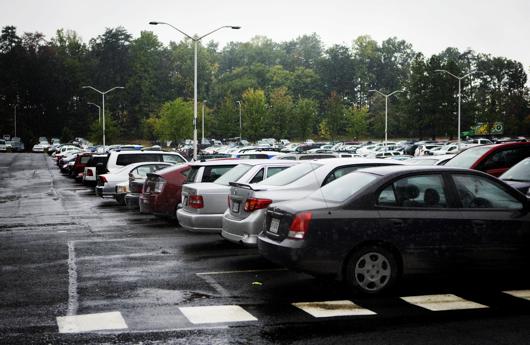Student Government urges Parking Services Advisory Committee to reduce costs
Student Government recently passed a resolution entitled “A Resolution in Support of a Parking Citation Fine Reduction Policy,” which supports a 15 percent decrease in all parking fines. It was passed 33-0-2 at the Nov. 21 meeting.
Evan Del Duke, the author of the resolution and the speaker pro-tempore of the senate, said the main goal of the resolution is to start a conversation with administrative offices, such as the Parking Services Advisory Committee, about how to save students money on parking costs.
“We are just asking that in their [Parking Services Advisory Committee] December meeting that they consider adopting something or having a conversation about different ways that they could try and reduce cost for students,” Del Duke said.
One reason Del Duke became interested in reducing costs for students is that students already contribute greatly to parking revenue without the additional costs of citation fines.
“The resolution basically says that, seeing as students pay upwards of half a grand on parking - upwards of $600 for parking deck permits, upwards of $500 for reserved spaces - since they already pay a huge chunk of the parking system that when they do incur a citation or something along those lines that...the Parking Advisory Committee look into a program that is lesser for them,” Del Duke said.
The resolution states support of a 15 percent reduction, but Del Duke said that specific amount is not necessarily the main goal of the resolution.
“The process of passing resolutions [is] really to give our executive counterparts the tools they need to advocate on behalf of the students,” Del Duke said.
Del Duke has worked with Michael Lagana, chairman of the Parking Appeals Board, on the issue of parking costs.
“Michael I believe will be at the December meeting of the Parking Advisory Board,” Del Duke said. “So basically, this resolution, it’s just going to give him the tools to begin the conversation about can [they] explore programs or policies that could save students money anywhere.”
Del Duke said in the past Student Government has had a “positive working relationship” with parking offices and he understand a reduction in fines would leave less money to provide other services for students.
“Any student savings would be a loss of revenue to them and they already operate on deficit because they have to provide transportation, shuttle system and different things like that,” Del Duke said. “Student Government understands they have problems to cover the cost of the whole system to not run on a deficit.”
By supporting a penalty fine reduction, Del Duke thinks changes in parking policy may be more likely to occur because the suggestion is realistic.
“It’s kind of a realist approach to say this is how we can try to save students money [and] we hope you accept this kind of conversation starter,” Del Duke said. “It’s not telling [the Parking Advisory Board] what they already know. It’s elaborating on something they could possibly implement or at least discuss. [The resolution] was myself evaluating what could be accomplished.”
The inspiration for the resolution came from a desire to ease the cost of college for students.
“It’s just saying that if you pay into the system upwards of $600 when you have tuition, housing, eating, entertainment on top of that, maybe a 15 percent reduction in those kinds of policies [should] be explored,” Del Duke said.

